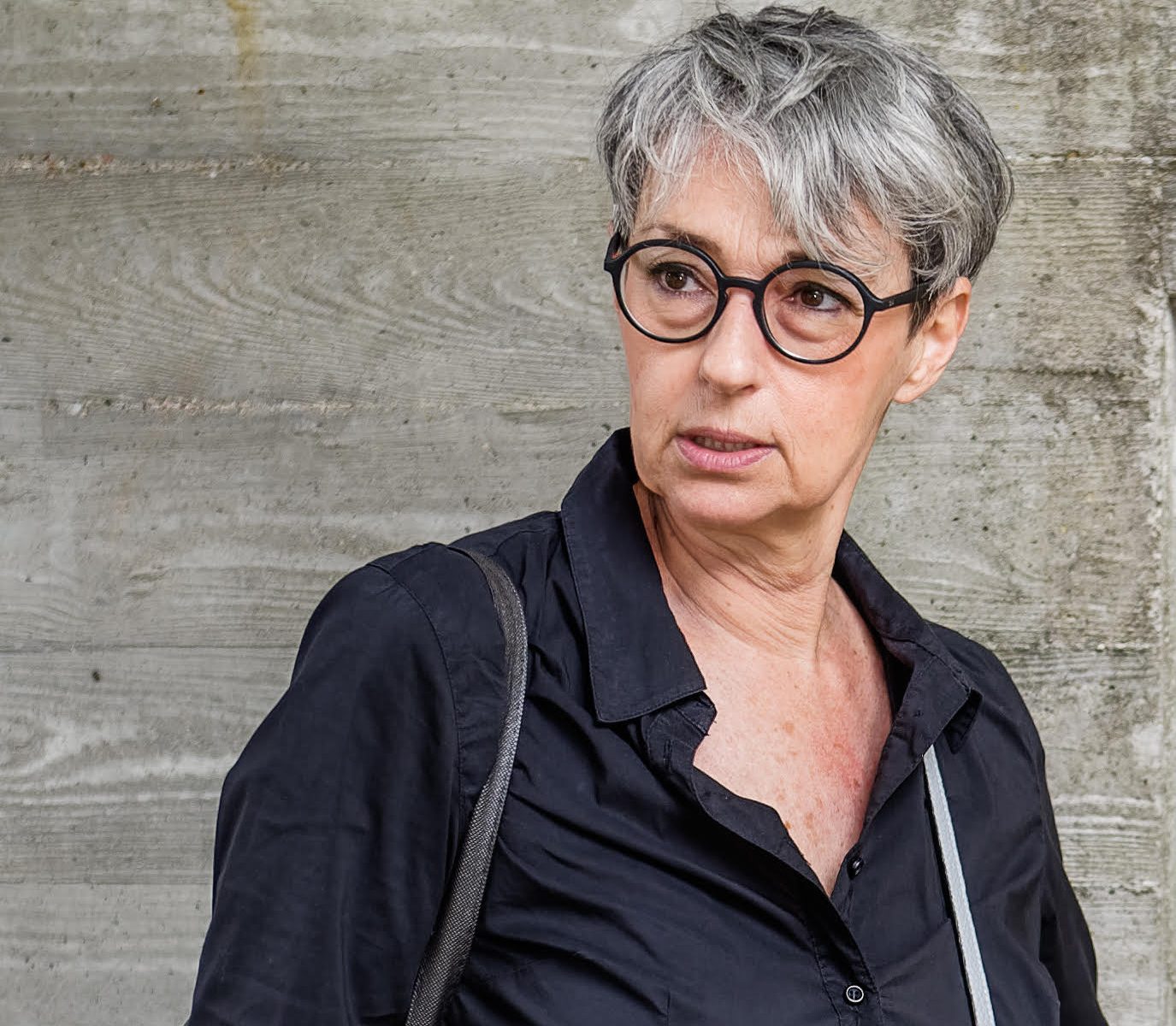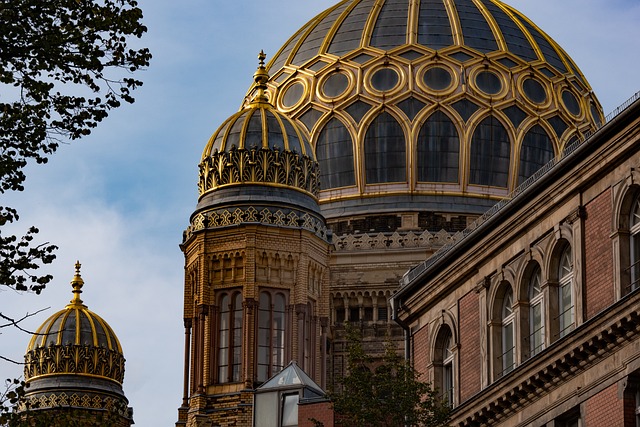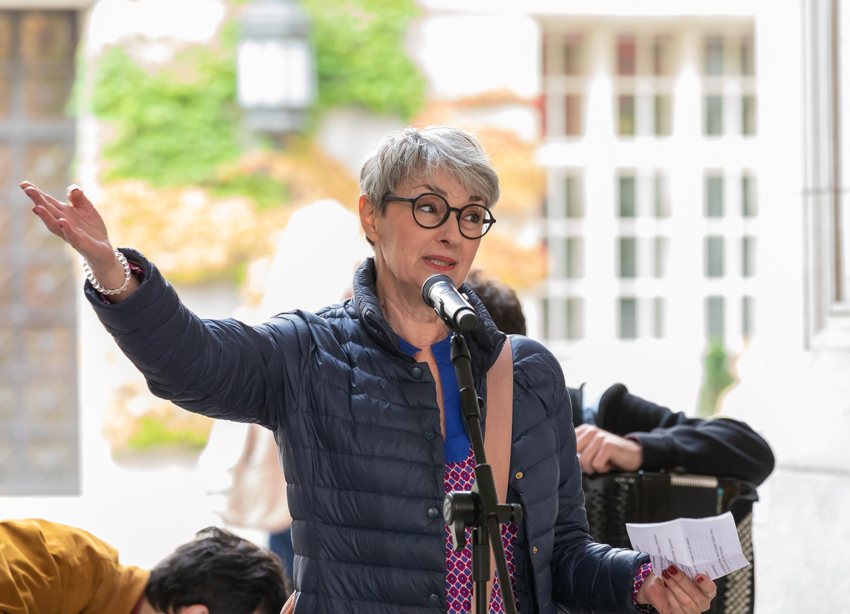
Who would have thought that there is such a profound story behind the often carelessly uttered “break a leg”? Nirit, a woman full of life and passion, not only gave me an understanding of the roots of this expression during a tour of the New Synagogue on Oranienburgerstrasse in Berlin, but also gave me an insight into her eventful life.
“Break a leg”*(German: Hals und Beinbruch.) – originally derived from the Hebrew ‘Hazlach We-Bracha’, which means ‘success and blessing’ – is more than just a phrase for Nirit. It is an expression of hope and good wishes.
Nirit, whose name means “wild fennel” in Hebrew, is like a wild flower that makes its way through life. Born in Israel, she moved to Berlin over 37 years ago. “Charlottenburg was a bit too boring for me,” she confessed to me with a laugh. “I need the variety and contact with people.” She now lives in Prenzlauerberg.
For Nirit, Berlin is more than just a city; it is her home, her inspiration. She loves the energy of the city, the diversity of the people and the constant movement. And so, she dances through life, sometimes to the sounds of funk and hip-hop, sometimes to classical music. “When I used to drive my sons to school, we used to alternate between listening to classical music and then really loud rock every morning,” she told me with a smile. “We’d all sit in the car and head bang.”
Her passion for film was the compass that led her to Berlin, to an international film festival that seemed like a childhood dream to her. Even as a young girl, she had dreamed of becoming an actress. But life had other plans for her. She had to admit to herself that being on stage would not be enough, so she turned to directing with dedication.
It was this unbridled love of film that brought her to Berlin, where she met her future husband at the film festival in Munich. Her heart finally led her to move to Berlin after overcoming the challenges of a long-distance relationship.
Before her trip to Berlin, her life had followed an orderly path: school, military service, studies, and finally marriage. She had married in Israel, but the marriage did not last.
When I asked her what she took away from her time in the military, she replied with a smile that discipline and the belief that more is always possible were the most valuable lessons. In Israel, military service is a formative experience for women and men alike.
But after October 7, 2023, she can no longer really relax, the only thing that helps her is knitting and dieting. “It holds me together like a corset!” she confesses to me. That day, she had to painfully realize that many of her supposed friends were not real friends. The silence was deafening. No one came forward. Eight long weeks passed in agonizing uncertainty, with no one inquiring how she or her family were doing. Finally, she took heart and wrote a WhatsApp message to her group of friends. In it, she explained that her family was doing well, but her heart was heavy because no one had contacted her in this long time. Feeling disappointed and sad, she had to remove seven out of ten names from her friends list. “It was a sobering and bitter experience,” she confessed with a sigh that reflected the emptiness inside her.
Her sons are also confronted with the powerlessness of doing nothing in their everyday lives. One of her sons founded an anti-Semitism group at Humboldt University with Jewish and non-Jewish fellow students. “This passivity makes you depressed,” she tells me, looking sad.
Deep down, she hopes that her work will bring a spark of change into the world. A spark that inspires people to draw conclusions from the past. She dreams of a world where people speak openly and warmly with each other, where cultures mix and enrich each other. Her greatest wish is that respect and tolerance are not just empty words, but a lived reality.

Sometimes it hits her like a blow to the heart when she realizes how little even neighbors know about each other. The words of an Israeli friend still echo in her mind: “I don’t have any German friends, they all seem so closed off.” In a moment of compassion, she asks him if he has ever dared to take the first step and extend his hand in friendship. But he just shakes his head and leaves her pondering.
Her soul burns with the desire for people to treat each other with openness and tolerance. She firmly believes that Germans must learn not to hide their emotions, but to face them and embrace them. This is the only way to create a world in which everyone finds their place and the walls between hearts come down.
Her life in Israel was an adventure full of contrasts compared to her life in Berlin. When she moved to West Berlin in 1987, she had no idea that the opening of the Wall would turn the quiet street she lived on into a busy arterial road. Despite her description of her hometown as unsightly and desolate, it remains the place she calls home – a concept she herself finds absurd. After all, passports were unknown until the French Revolution and were only introduced in the 19th century. She affectionately calls her Syrian friend and café owner, where we meet, “brother”, as the bond that unites them goes beyond nationalities. It doesn’t matter that he is Arab and she is Israeli; what is important is the certainty of being there for each other.
The first steps in Berlin were challenging. Language barriers had to be overcome and the search for fulfilling work proved difficult. Various jobs in the film and television industry or in galleries did not bring the fulfillment she was looking for. But it was an uncle, a survivor of Auschwitz, who inspired her in 1997 to show Berlin from a new perspective by offering tours of the city.
The greatest joy of her work lies in the continuous learning and exchange with the participants.

As a film director, she is dedicated to the project “You look so German!” to unravel the threads of the past. A chance encounter in Berlin with a distant relative opens the door to a fascinating journey into her family’s history.
As an Israeli tour guide in Berlin, she accompanies visitors through the shadows of the Holocaust past. Until now, she has kept an emotionally protective distance, believing that her family was not affected. But a meeting with a distant cousin reveals the tragic story of her relatives Kurt and Thekla Feuerring, who once lived near her current home before becoming victims of the atrocities. This realization initiates her personal journey into the family history. Confronted with the painful truth that she lives in the land of the perpetrators; she collects the pieces of the Feuerring family history puzzle and shares them with her relatives in Israel.
And the next time you wish someone “Break a leg” remember: there is much more behind these words than just a congratulation. It is an expression of hope, affection and the wish that the other person will achieve their goals.
I am so happy to have met Nirit. She has enriched my life and shown me how important it is to follow your dreams and welcome life with open arms.

